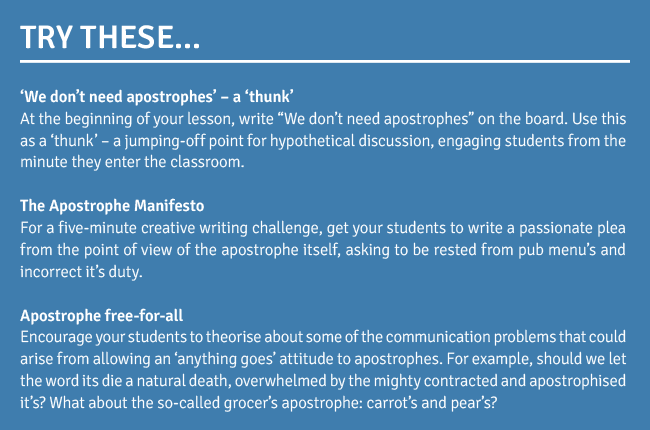There comes a time in every English teacher’s career – even when teaching A* pupils – when we realise that an essential and common word in the English language, that we have read and used many thousands of times, appears to have been erased from the brains of our students.
It’s not a word that has fallen into obscurity – like neaf, or villiago, for example – and it isn’t an esoteric word, like juju or métier. “Ladies and gentlemen,†I find myself saying to classes, “I bring to you the word its†(and I write its on the board).
They will gaze at this word with blank faces and wonder. “So, what does it mean?†I will ask.
“It means ‘it’s cold outside’,†one might offer. “The school has changed its uniform,†another might say. And they’ll see me do a kind of wavy-head, yes/no gesture. And then one will generally offer, “But shouldn’t that have an apostrophe in it?â€
That’s when I will pounce.
“No! It should not have an apostrophe in it. It doesn’t need an apostrophe because it is a word all of its own. I’ll prove it to you.†And I will write The dog is lying in its kennel.
“But,†they say, “the kennel belongs to the dog, so ‘its’ should have an apostrophe in it, definitely.â€
And so comes the explanation, that its is a word all of its own. It is the gender-neutral equivalent of his and her. The only time we put an apostrophe between it and s is when we are showing contraction, moving from it is to it’s. The ONLY time, people.

They are sceptical, but once they start to look through newspapers and books for examples, it dawns on them that I was actually right; there IS such a word as its. It’s a revelation.
But the apostrophe is sadly overworked, and it inserts itself in all kinds of places, tripping up sign-writers, proofreaders and journalists.
My Osiris course looks at GCSE A* English Language students and how we can develop a deeper understanding of the structure of language. Discussing the apostrophe with classes enables me to develop the highest-level skills of thought and argument, and can foster conscious reading and a fuller understanding of the nuances of the English language. Therefore, if for no other reason, we should thank the apostrophe, and champion it, despite its bewildering ubiquity. SR

